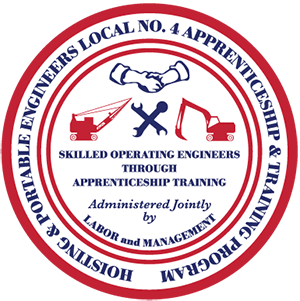Brothers and Sisters,
To start, I would like to congratulate Business Manager William D. McLaughlin, as well as all of the Line Officers and Executive Board, on yet another unopposed election. It was great to see them all installed once again. You can’t argue with success, and we are all benefiting from it. Keep up the good work!! As our summer season closes and we gear up for fall, I would like to focus this Safety Corner on our hoisting regulations here in Massachusetts. There has been an unprecedented boom in the construction industry the last several years. Unfortunately, with that means some heavy equipment accidents. In response to this, the Office of Public Safety and Inspections (formerly the Department of Public Safety) has been out inspecting job sites. Here is some information on what they will be looking for.
Massachusetts is one of sixteen states that has a hoisting or crane license as part of their state law. This is a great tool for the Commonwealth and Local 4. It ensures a minimum standard for all hoisting equipment. It helps keep out-of-state contractors from bringing their unqualified operators to our cities and towns, which in turn helps us put our members to work. The regulations can be found online by searching 520 CMR 6.00. You can call the Training Center and we can mail a printed copy. These regulations apply to both public and private property. The criteria for equipments covered are pretty broad. Any mechanically powered equipment (not including steam) that can lift a load of five hundred pounds, hoist a load over ten feet, and/or has a bucket that exceeds a quarter yard of material requires a hoisting license. Most sub-compact tractors and stand-on skid steers require hoisting licenses. Massachusetts General Law 146 Section 54A spells out a penalty of no less than five hundred dollars, and no more than three thousand dollars, or by imprisonment for not more than three months. Or both fine and imprisonment!! Not something to mess around with.
If an Office of Public Safety Inspector shows up on site, you must allow him on the premises. Anyone who prevents or attempts to prevent any inspector from entering the premises in the discharge of his duties is subject to a fine of not less than two hundred and fifty dollars, and not more than three thousand dollars, or by imprisonment of up to three months, or both. The regulation sets a baseline for how the equipment must be operated. It states all hoisting machinery shall be operated in accordance with the manufacturer’s specifications and in a safe manner at all times. Maintenance, repair, and refueling shall be done when the machine is inoperable and secure. A visual inspection and daily log sheet must be maintained in accordance with OSHA standards. The operator shall not engage in any practice that will divert their attention while engaged in operating the hoisting machinery. Leave the cell phones in the car!! If the safety lever is engaged, you are operating!! At no time shall the operator operate the machine beyond its rated capacity without the manufacturer’s approval. Other than assembly/disassembly, the use of a load moment indicator override key or the entering of false crane set-up criteria to increase rated capacity is strictly forbidden. The operator is responsible for all operations under their control. When there is doubt as to the safety of those operations, the operator has the authority to stop handling loads until safety is ensured! You have that authority under state law, don’t be afraid to use it.
If you are involved in an incident that results in serious injury, property damage, or death, you must notify OPSI within one hour. If the incident makes the news, call it in!! You should also notify your Business Agent and a Safety Officer. As always, if you have any questions or are interested in upgrading your licenses, please reach out. Enjoy a safe fall season!!
Be safe out there,
Thomas McEvoy
